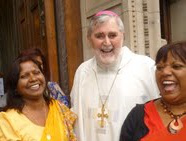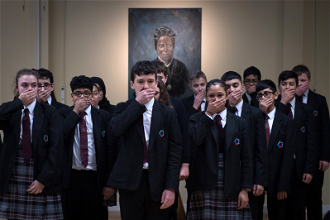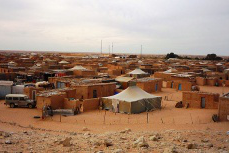Text: Bishop Pat Lynch at London Migrant Mass

Bishop Lynch with members of Goan community after Mass- pic ICN
Bishop Patrick Lynch SSCC gave the following homily at this morning's Mass for Migrants on the Feast of St Joseph the Worker at Westminster Cathedral. A full report will follow later today.
When I was a young priest working in Peterborough one of my responsibilities was to celebrate Mass in a sugar beet factory very early on a Sunday morning. The seventy men who attended were all fishermen from the West of Ireland who had come to work in what was called the ‘sugar beet campaign’ when the summer fishing season was over.
The Mass itself was usually uneventful. There was always a strong smell of beet in the air, the participation of the men was minimal and needless to say the homily was always very brief. However, when one remembers that fifty percent of the men had just finished the night shift and the other fifty percent were just beginning the morning shift it was amazing that anyone was there at all. Nevertheless, I learnt a great deal from those men about the hardships involved in being a seasonal migrant worker - the long hours, the low pay and the poor living conditions - but also about how deeply committed they were to their families, to their faith and to their fellow workers. There were two men in particular who epitomised that solidarity – Michael and Seamus. Both of them had families back in the West of Ireland and both were experienced sugar beet workers. They would regularly watch out for the younger lads – encouraging them to send money home to their families, encouraging them not to drink too much on their days off and encouraging them to come to Mass on Sundays. They helped me to understand the importance of solidarity for migrant workers facing of hardship.
I start with that experience because our readings today - for the Feast of St. Joseph the Worker – invite us to reflect on three important elements of the Church’s mission to migrant workers – affirming the dignity of migrants, promoting solidarity with and amongst migrants and speaking out prophetically on behalf of migrants.
Affirming the dignity of migrants. The first reading from the book of Genesis outlines the key principles of social life for the People of Israel.
- The importance and dignity of every human being.
- The importance of family, community and solidarity.
- The responsibility we have as human beings to contribute to human development, to care for the human community and to care for creation.
In the Gospel Matthew reminds us that Joseph was a tradesman – a carpenter – but in the opening chapters of his Gospel he has already told us how Joseph and Mary were in fact uprooted from their home three times. First they had to travel to Bethlehem for the census, then they fled to Egypt and finally they returned to Nazareth when it was safe to return. In other words Mary and Joseph were refugees and Joseph was in fact a migrant worker.
The Church’s affirmation of the dignity of migrants and migrant workers is therefore inspired by the experience of the Holy Family and flows from our belief that everyone is made in the image and likeness of God. The contribution of migrant workers to society should therefore be measured not just by the amount they earn but rather by they good they do. Your contribution to British society is important and your contribution to the Church is important. You enrich our society through the values you live, through your commitment to your families and through your dedication to national institutions like the National Health Service. You enrich the Church through your love for the Scriptures and your enthusiasm for worship. My first prayer today is, therefore, a prayer of gratitude for the contribution that migrant workers make to our Church, our society and our culture.
Promoting solidarity with and amongst migrants. The word ‘solidarity’ is not an easy word to understand. In three of his encyclicals Pope John Paul II repeatedly called ‘solidarity’ an essential virtue of social life. ‘Solidarity’ he suggested is an interior attitude which recognizes that to be human is to be interdependent but it is also an active virtue whereby we commit ourselves to promoting the common good. This means doing all we can to help people to connect with, belong to and participate in all the networks, communities and organizations that are an essential part of life in Britain today.
The Catholic Church here in England and Wales has a long tradition of standing in solidarity with workers, especially migrant workers who feel on the fringes of society - those who worked in the fields ( before, during and after the Second World War), those who worked in the docks in London or Liverpool, those who worked in the car industry in Birmingham, Coventry and Dagenham, and especially those who today work in construction or catering, in the cleaning or caring services or in farming, fishing or food processing.
My second prayer this morning is also a prayer of gratitude - gratitude for all our ethnic chaplains and leaders of ethnic communities, for all the clergy, religious and laity, for all the parishes, parish groups and organizations who have worked tirelessly to facilitate greater participation and involvement of migrant workers and migrant groups in the life of the Church and in society.
Speaking out prophetically on behalf of migrants. In today’s Gospel Matthew describes the hostile reaction evoked by Jesus’ prophetic teaching. That teaching had both a comforting and a challenging character – always proclaiming a message of hope but always calling the listeners to change and conversion. The parables of Jesus present us with a choice. We can respond positively like true disciples or negatively like the people of Jesus’ home village.
Likewise, if we are to be a prophetic community we too must proclaim a message of hope that God is close to the poor, the vulnerable, the exploited, those seeking asylum and those who are undocumented. This means having the courage to speak out against injustice and unfairness. It is important, however, to see injustice and unfairness through the eyes and example of Jesus – in other words through the eyes and experience of those who suffer most. Jesus always reached out to the suffering and the struggling and associated with those who were excluded. He helped people especially those struggling and suffering to experience the closeness of God’s presence in their lives. That is why the Church is concerned about migrants and especially the most vulnerable – domestic workers, those who are trafficked, those who are homeless and those who are poorly paid. A basic principle of Catholic Social Teaching is that everyone deserves to be treated fairly and helped appropriately.
The Church is also concerned for workers’ families. A family does not cease to be a family because one of its members emigrates overseas. The Universal Declaration of Human Rights (16.3) recognizes the family as “the natural and fundamental group unit of society entitled to protection by society and the State”. The right of families to reunite should be a priority in a civilized state.
So my final prayer is that God will give all of us the courage to speak out prophetically and do what we can to prevent migrant workers from within or outside the European Union becoming scapegoats and targets of popular frustration with the economy. Jesus preached a message of hope and was by the way he accompanied others and the way he helped and healed others a sacrament of hope. Today we ask the Lord to help us to continue his mission.





















